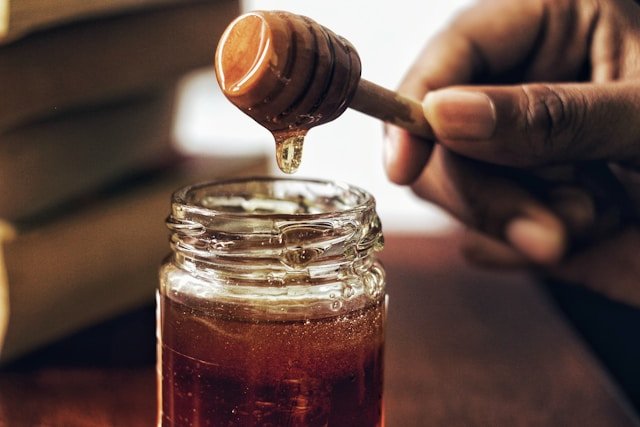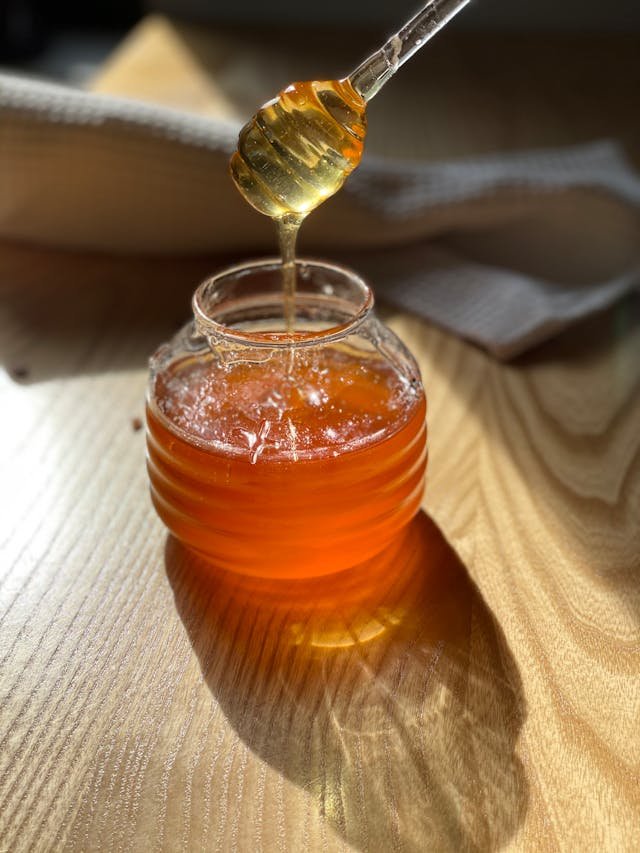Introduction to African Honey
Honey is a timeless treasure, revered for its taste, health benefits, and versatility. As my previous article Exploring Global Honey ,I have introduced the verities of honey of different parts of the world. But today is for African honey, with its distinct varieties, offers a unique journey from the dry savannahs to the deep jungles. This comprehensive guide will introduce you to the diverse world of African honey, its nature, and its many uses. By exploring this guide, we will understand the outstanding flavors and cultural significance of African honey, making it a valuable addition to your knowledge. Africa’s vast and varied landscapes provide an ideal environment for beekeeping. The continent’s different types flora results in a wide range of honey varieties, each with unique characteristics influenced by local plants, climate, and traditional beekeeping practices. African honey is known not only for its distinct flavors but also for its numerous health benefits and uses in traditional medicine.
Savannah Honey
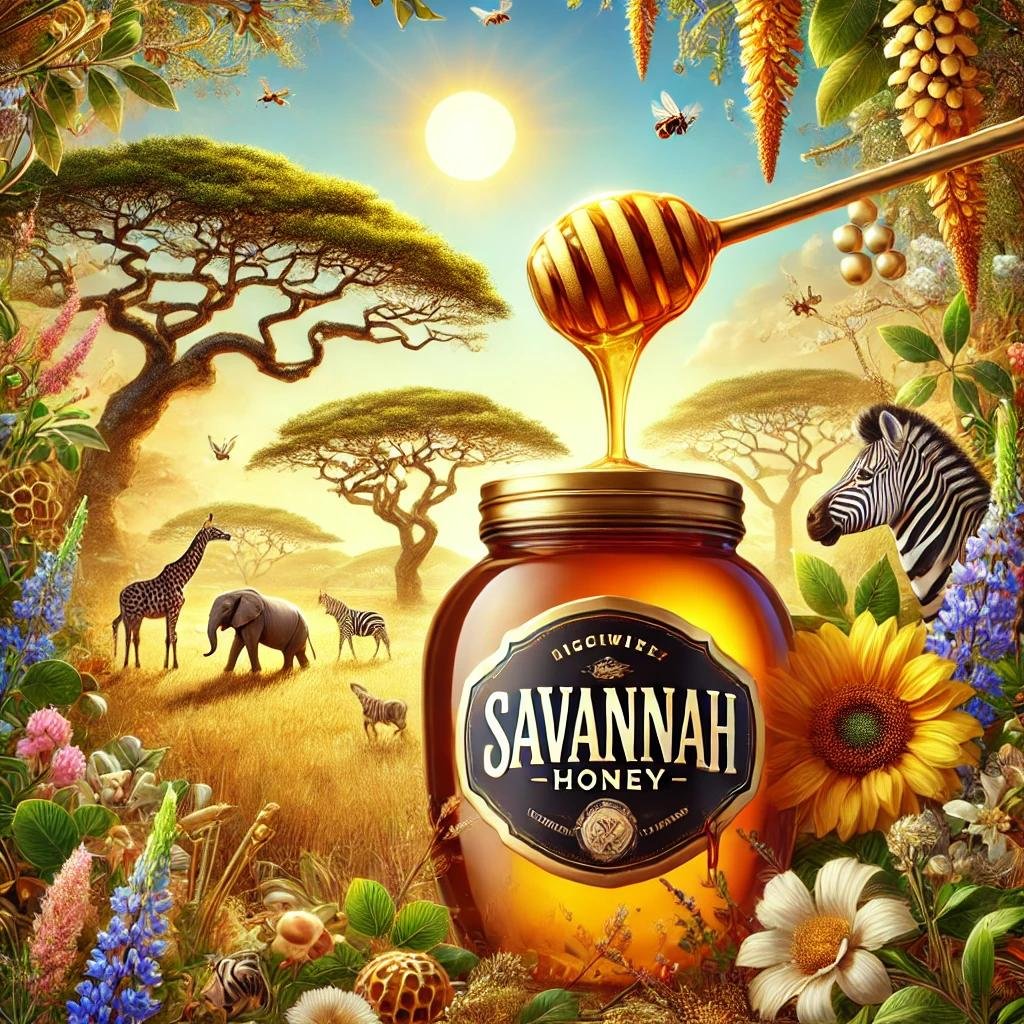
Region and Flora: Savannah Honey is a premium variety sourced from the rich and diverse savannah regions of Africa and the southeastern United States. These areas are known for their abundant and diverse flora, including wildflowers, acacia, clover, and other native plants. The unique vegetation of these regions imparts a distinctive and rich flavor to the honey, making it a highly sought-after delicacy.
Characteristics: This golden honey is renowned for its smooth texture and sweet, floral aroma. Its flavor profile is a harmonious blend of sweetness and floral notes, reflecting the rich biodiversity of the savannah. Savannah Honey is also packed with antioxidants and essential nutrients, making it not only a delightful treat but also a health-boosting superfood. Its natural properties promote overall wellness, making it a favorite among health-conscious consumers.
Uses: Savannah Honey is incredibly versatile and can be used in a variety of ways. It’s perfect for sweetening tea, adding a touch of natural sweetness to your morning coffee, or drizzling over pancakes, yogurt, and desserts. Its rich flavor also enhances savory dishes, making it a great addition to marinades and dressings. Whether used as a spread, a sweetener, or a flavor enhancer, Savannah Honey brings a touch of natural goodness to any dish.
Jungle Honey

Region and Flora: Jungle Honey is a premium variety sourced from the dense and vibrant jungles of South America and Southeast Asia. These regions are renowned for their lush, tropical vegetation, including exotic flowers, fruit trees, and medicinal plants. The diverse flora of these jungles imparts a unique and rich flavor to the honey, making it a prized delicacy.
Characteristics: This dark, amber honey is known for its rich, complex flavor and thick, luscious texture. It carries a bold, slightly earthy taste with hints of tropical fruits and floral undertones. Packed with antioxidants, vitamins, and minerals, Jungle Honey is a powerhouse of nutrients, offering numerous health benefits. Its natural properties support immune health and overall wellness, making it a favorite among those seeking a natural health boost.
Uses: Jungle Honey is highly versatile and can be used in various culinary applications. It’s perfect for sweetening tea, enhancing the flavor of smoothies, or drizzling over oatmeal, pancakes, and desserts. Its robust flavor also complements savory dishes, making it an excellent addition to marinades, dressings, and sauces. Whether used as a natural sweetener, a spread, or a flavor enhancer, Jungle Honey adds a touch of exotic richness to any dish
Mountain Honey

Region and Flora: Mountain Honey is a premium variety harvested from the pristine and elevated regions of the Himalayas, the Rockies, and other mountainous areas worldwide. These regions are characterized by their diverse and untouched flora, including alpine flowers, wild herbs, and endemic plants. The unique vegetation of these high-altitude areas imparts a distinct and rich flavor to the honey, making it a treasured delicacy.
Characteristics: This honey is known for its light to medium amber color and smooth, creamy texture. It offers a complex flavor profile with sweet, floral notes and a hint of herbal undertones, reflecting the diverse flora of the mountains. Packed with antioxidants, vitamins, and minerals, Mountain Honey is a natural superfood that supports overall health and wellness. Its purity and nutritional benefits make it a favorite among health-conscious individuals.
Uses: Mountain Honey is incredibly versatile and can be used in various culinary applications. It’s perfect for sweetening tea, enhancing the flavor of baked goods, or drizzling over yogurt, cereals, and desserts. Its rich flavor also complements savory dishes, making it an excellent addition to glazes, marinades, and dressings. Whether used as a natural sweetener, a spread, or a flavor enhancer, Mountain Honey adds a touch of natural richness to any dish.
Wild Honey
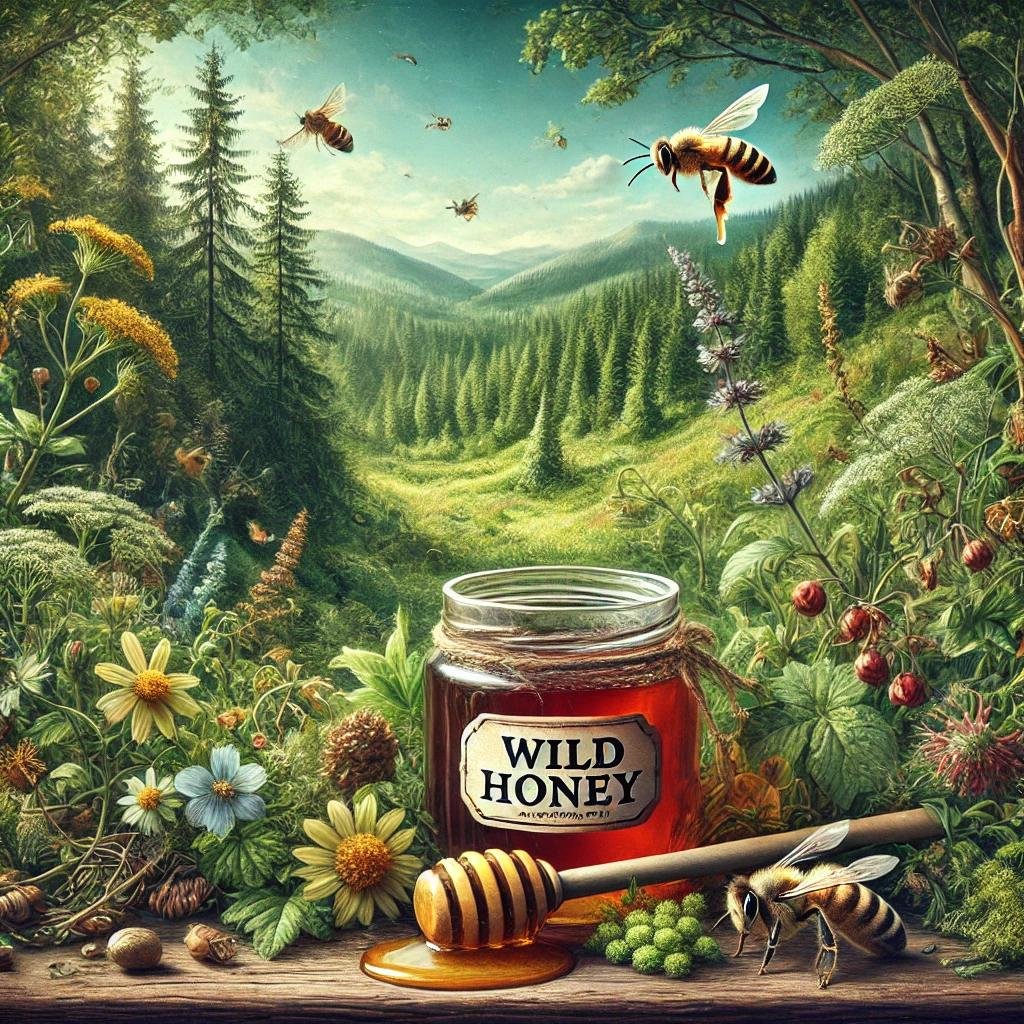
Region and Flora: Wild Honey is a premium variety sourced from remote and untouched wilderness areas across the globe, including forests, meadows, and natural reserves. These regions are home to diverse and abundant flora, including wildflowers, herbs, and native plants. The natural vegetation of these wild areas imparts a distinctive and rich flavor to the honey, making it a highly prized delicacy.
Characteristics: This honey is known for its raw, unprocessed nature, offering a dark to light amber color and a robust, multifaceted flavor. It carries a sweet, floral taste with complex earthy undertones, reflecting the rich biodiversity of its source regions. Packed with antioxidants, enzymes, and nutrients, Wild Honey is a natural health booster that supports immune health and overall wellness. It is pure and raw properties make it a favorite among those seeking natural and wholesome food products.
Uses: Wild Honey is highly versatile and can be used in a variety of culinary applications. It’s perfect for sweetening tea, adding natural sweetness to smoothies, or drizzling over pancakes, yogurt, and desserts. Its bold flavor also enhances savory dishes, making it an excellent addition to marinades, dressings, and sauces. Whether used as a spread, a natural sweetener, or a flavor enhancer, Wild Honey brings a touch of natural richness to any dish.
Forest Honey

Region and Flora: Forest Honey is a premium variety harvested from the dense and diverse forests of Europe, North America, and Asia. These regions are abundant in wildflowers, trees, and shrubs, providing a rich and varied floral source for bees. The unique vegetation of these forested areas imparts a distinctive and rich flavor to the honey, making it a highly prized natural product.
Characteristics: This honey is known for its dark amber color and smooth, thick texture. It offers a complex flavor profile with deep, woody notes and a hint of floral sweetness, reflecting the diverse flora of the forests. Rich in antioxidants, vitamins, and minerals, Forest Honey is a natural superfood that supports overall health and wellness. Its purity and nutritional benefits make it a favorite among health-conscious individuals.
Uses: Forest Honey is incredibly versatile and can be used in various culinary applications. It’s perfect for sweetening tea, enhancing the flavor of baked goods, or drizzling over yogurt, cereals, and desserts. Its rich flavor also complements savory dishes, making it an excellent addition to glazes, marinades, and dressings. Whether used as a natural sweetener, a spread, or a flavor enhancer, Forest Honey adds a touch of natural richness to any dish.
Coastal Honey

Region and Flora: Coastal Honey is a premium variety harvested from the scenic coastal regions of Australia, California, and the Mediterranean. These areas are renowned for their unique coastal vegetation, including sea lavender, wild thyme, and coastal sage. The diverse flora of these seaside landscapes imparts a distinct and rich flavor to the honey, making it a treasured delicacy.
Characteristics: This honey is known for its light to medium amber color and smooth, creamy texture. It offers a complex flavor profile with sweet, floral notes and a subtle hint of saltiness, reflecting the coastal environment. Packed with antioxidants, vitamins, and minerals, Coastal Honey is a natural health booster that supports overall wellness. Its pure and natural properties make it a favorite among those seeking wholesome food products.
Uses: Coastal Honey is highly versatile and can be used in various culinary applications. It’s perfect for sweetening tea, enhancing the flavor of baked goods, or drizzling over yogurt, cereals, and desserts. Its unique flavor also complements savory dishes, making it an excellent addition to glazes, marinades, and dressings. Whether used as a natural sweetener, a spread, or a flavor enhancer, Coastal Honey adds a touch of seaside richness to any dish.
Desert Honey
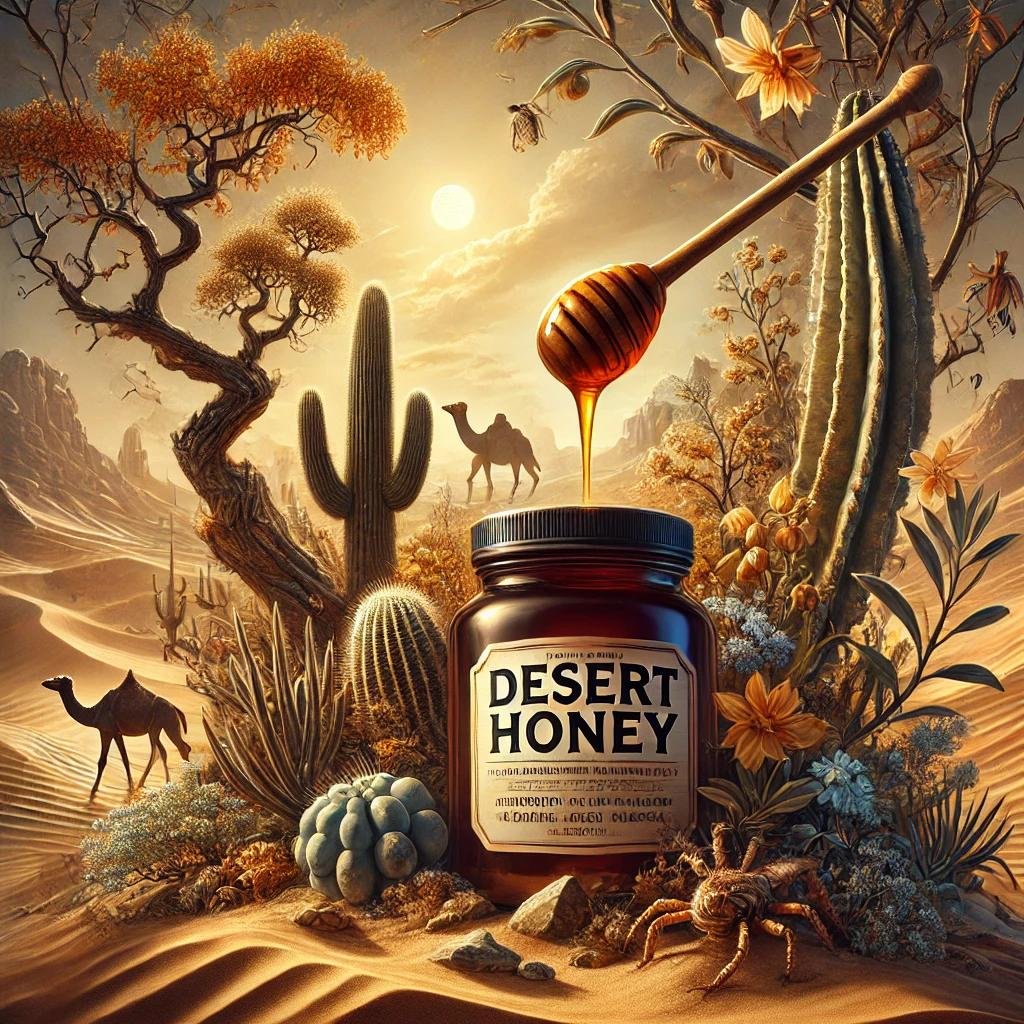
Region and Flora: Desert Honey is a premium variety harvested from the arid and sun-drenched regions of the Southwestern United States, the Middle East, and Northern Africa. These areas are characterized by their unique and resilient vegetation, including mesquite, acacia, and desert wildflowers. The flora of these harsh environments imparts a distinctive and rich flavor to the honey, making it a prized delicacy.
Characteristics: This honey is known for its amber to dark amber color and smooth, thick texture. It offers a complex flavor profile with deep, earthy notes and a hint of caramel sweetness, reflecting the diverse and hardy plants of the desert. Packed with antioxidants, vitamins, and minerals, Desert Honey is a natural superfood that supports overall health and wellness. Its purity and nutritional benefits make it a favorite among health-conscious consumers.
Uses : Desert Honey is incredibly versatile and can be used in a variety of culinary applications. It’s perfect for sweetening tea, adding a unique flavor to baked goods, or drizzling over yogurt, cereals, and desserts. Its rich flavor also enhances savory dishes, making it an excellent addition to glazes, marinades, and dressings. Whether used as a natural sweetener, a spread, or a flavor enhancer, Desert Honey brings a touch of desert richness to any dish.
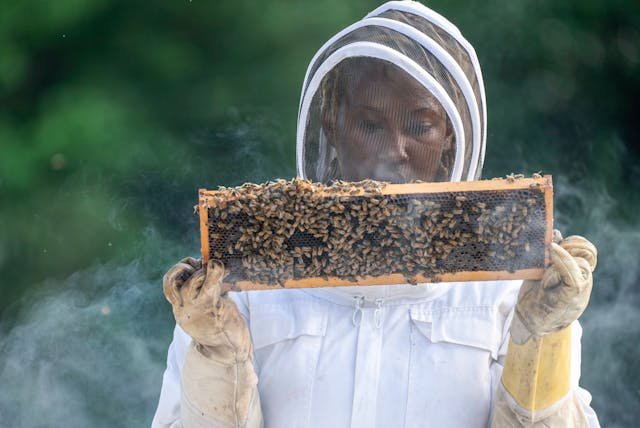
The Nature of African Honey
African honey is prized for its purity and natural production methods. Many African beekeepers practice traditional methods, avoiding chemicals and artificial feeding, resulting in organic honey free from contaminants. The environment plays a crucial role, with varied climates influencing the characteristics of the honey. For example, honey from the savannah tends to be lighter and milder, while jungle honey is often darker and more robust.
Health Benefits of African Honey
1. Antibacterial and Antifungal Properties: African honey has natural antibacterial and antifungal properties, making it useful for treating wounds, burns, and skin infections.
2. Rich in Antioxidants: Honey is a source of antioxidants, which help combat free radicals and reduce the risk of chronic diseases.
3. Boosts Immunity: Regular consumption of honey can boost the immune system, making the body more resilient to infections.
4. Soothes Sore Throats and Coughs: Honey is a well-known remedy for sore throats and coughs, soothing irritation and reducing coughing.
5. Promotes Digestive Health: Honey aids in digestion and can help with conditions like ulcers and gastroenteritis.
Traditional and Modern Uses of African Honey
Traditional Uses:
• Medicine: Used in traditional African medicine for treating wounds, burns, and various ailments.
• Rituals and Ceremonies: Honey is often used in cultural rituals and ceremonies, symbolizing prosperity and purity.
• Food and Beverage: Traditionally used as a sweetener and in the preparation of various local dishes and drinks.
Modern Uses:
• Culinary: African honey is increasingly being used in gourmet cooking and baking. Its unique flavors enhance dishes and add a natural sweetness.
• Skincare: Due to its moisturizing and antibacterial properties, African honey is used in various skincare products, including face masks, lotions, and soaps.
• Health Supplements: Honey is marketed as a natural health supplement, promoting overall wellness and immune support.
Sustainable Beekeeping Practices in Africa
Sustainability is key to preserving the diverse honey varieties in Africa. Many African beekeepers are adopting sustainable practices to ensure the health of bee populations and the environment. These practices include:
1. Organic Beekeeping: Avoiding the use of chemicals and artificial feeding, ensuring the production of pure and natural honey.
2. Conservation Efforts: Protecting natural habitats and promoting biodiversity to support healthy bee populations.
3. Community-Based Initiatives: Supporting local communities through beekeeping projects, providing income and promoting sustainable agriculture.
Challenges Facing African Beekeeping
Despite its many benefits, African beekeeping faces several challenges:
1. Climate Change: Changes in climate patterns affect the availability of forage for bees, impacting honey production.
2. Pesticides: The use of pesticides in agriculture can harm bees and reduce honey yields.
3. Deforestation: Loss of natural habitats due to deforestation poses a significant threat to bee populations.
4. Lack of Resources: Many small-scale beekeepers lack access to modern equipment and training, limiting their productivity and income.
Conclusion
African honey is a remarkable product with a rich diversity that reflects the continent’s varied landscapes. From the savannah to the jungle, each variety of African honey offers unique flavors and health benefits. Embracing sustainable beekeeping practices is essential to preserving this natural treasure and supporting the livelihoods of African beekeepers.
Whether you are a food enthusiast, a health-conscious consumer, or someone interested in natural products, African honey is a delightful and beneficial addition to your pantry. Its distinct flavors and numerous health benefits make it a standout choice among the many types of honey available worldwide.

